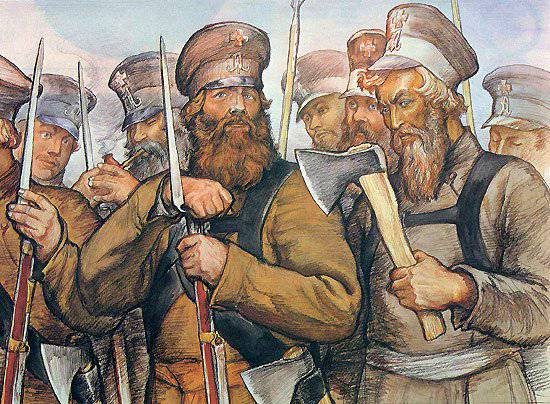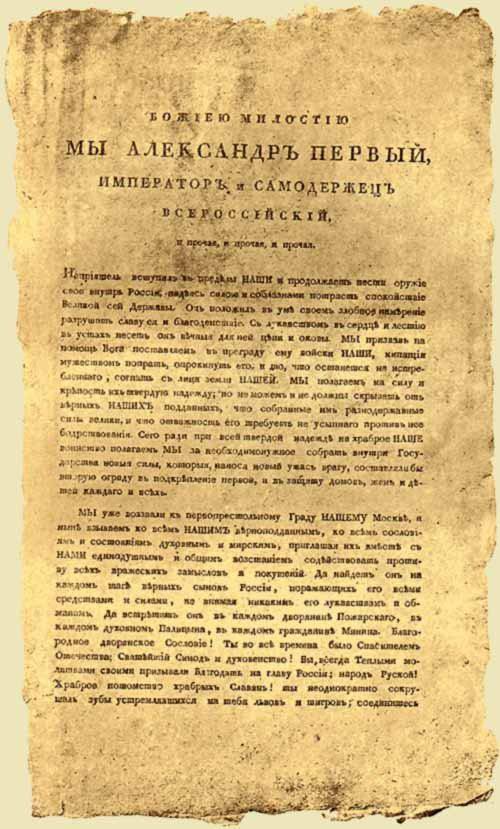The beginning of the people's war

The manifestations of the people's war against Napoleon’s Great Army can be seen from the very beginning of the 1812 campaign of the year. Already in the territory of Lithuania and Belarus, peasants attacked the invaders. These attacks were the response of the population to occupiers policy. Capturing Lithuania and Belarus, Napoleon Bonaparte was counting on the separatist aspirations of a significant part of the local nobility. The French provided Lithuania with a kind of self-government, but instead demanded people and food. In addition, Napoleon did not hold progressive events, which he introduced in a number of European countries. Thus, serfdom remained intact. As a result, the pressure on the peasantry was not only not relieved, but even intensified. The peasants were supposed to take food and livestock for the Great Army, pay new taxes and fulfill duties in favor of the invaders. Soon the peasants began to oppose the occupiers, and against the nobility, who collaborated with the French.
6 (18) July “Provisional rule of the Grand Duchy of Lithuania” demanded that all the peasants who left their homes when the French troops appeared, returned and began to perform agricultural work and duties. The next day, the Provisional Government and the spiritual authorities appealed to the nobility to gather peasants and persuade them to return to their previous activities. In Kurland, it was stated that no changes in the structure of this province and the relationship between the gentlemen and his subjects are expected. A similar statement was made after the capture of Smolensk.
The plundering and violence of the invaders, the growth of requisitions, the strengthening of landlord oppression — all this made the peasants take up weapon. And do not think that all the peasants moved only patriotic impulses. People were forced to protect themselves and loved ones. Others found the situation convenient for settling accounts with landlords. Peasants smashed homesteads, offices, killed nobles. Facts riots noted in the Smolensk province, the peasants of Dorogobuzh, Sychevsky and Vyazemsky districts killed landowners and divided noble lands among themselves.
Many nobles turned to the French for help. Davou in Mogilev declared that he would use military force to keep peasants in obedience to landowners. Vitebsk Governor Charpentier sent several punitive detachments to suppress peasant uprisings. In Smolensk, on the orders of Napoleon, a mobile convoy was organized in 200 by a soldier with a court martial who issued death sentences for revolts against landowners.
One of the main reasons for the growing resistance of the population was looting, violence and murder. Various types of crime against the local population were commonplace for a mixed tribe of invaders. They robbed, raped and killed everything - the French, Italians, Poles, and all sorts of Germans. Robberies and murders took place even in Vilna itself. So, almost all the houses were looted in the suburbs. Therefore, the peasants tried to go into the woods, taking the livestock with them and hiding food.
Residents of the village of Smolevichi of the Borisov district, the village of Trestyan of the Igumen district, the village of Zhartsy of the Polotsk district and a number of other rural settlements organized groups for self-defense and attacked the invaders. The population actively helped the Russian troops. So, to the garrison appointed to protect Mogilyov, citizens joined. They took part in the defense of the city. A detachment from the village Zhartsy took part in the Battle of Polotsk. The peasants attacked small enemy garrisons and fodder teams. As a result, to protect the rear, Napoleon was forced to leave about 50 thousand soldiers in Lithuania and Belarus.
Invaders could feel more or less calm only in cities. Here, under their protection, local noblemen fled. Shlyakhta waited for victorious news and handouts from Napoleon. However, as soon as news of the victories of the Russian army came, alarming rumors began to spread among the nobility. The defeat of part of the Saxon corps Rainier near Kobrin caused a real panic in Lithuania and Warsaw. They even wanted to start collecting militia to protect the capital of the Duchy of Warsaw. The news of the defeat of the Udino corps in the battle of Klyastitsy led to the fact that many Kurland landowners refused to surrender money, food and fodder to the French. Contribution has not been collected. In addition, the Lithuanian nobility now was in no hurry to create armed units for the Great Army.
It should be noted that the peasant revolts against the landowners alarmed the Russian government. In St. Petersburg, they did not forget about the sad experience of the Pugachev region. Alexander I orders the commander of the troops to use military force to quell riots. The commander of the 2 th reserve corps, F. F. Ertel, suppressed a peasant uprising in Ovruch. The commander of the 1 Infantry Corps, P.H. Wittgenstein, used force at Verro. After the French troops approached Dvina and occupied Vitebsk, the peasants of Surozhsky, Nevelsky and other povets drove out their landlords. Unrest began in the Polotsk district. Wittgenstein had to send troops to restore order. By decision of the court-martial, the leaders of the rebellion were sentenced to death. The actions of the central and military authorities were quite logical. During the invasion of the enemy army it was impossible to prevent the outbreak of a peasant war, this could lead to the death of Russian statehood. The very first shoots of riots were brutally suppressed.
Many feared the actions of Napoleon, aimed at enticing the peasantry to his side. So, N. N. Rajewski wrote from Nesvizh 28 June: “I am afraid of proclamations, so that Napoleon would not give liberties to the people, I am afraid in our land of internal turmoil”. F. F. Rostopchin wrote to the emperor about the readiness of people to "follow in the footsteps of Robespierre and Santer." Sovereign Alexander even ordered the governors to withdraw weapons from the rural population. Many nobles were afraid to arm the peasants to fight the French.
In July, the state tried to control the spontaneously initiated popular movement. 6 (18) July 1812, Alexander issued a Manifesto on the creation of a national militia and an appeal to the inhabitants of the “First Throne Capital of Moscow,” calling for the initiators of this “popular armament”. At the same time, it was emphasized that at the end of the war everyone would return to their former state and duties.
Two main factors became the basis of the people's war against the invaders. Firstly, Napoleon did not take active measures to “liberalize” the position of the peasantry. Secondly, it is the actions of the occupiers against the local population (robbery, murder and violence). For the people, representatives of the French army were clearly enemies, predators. Therefore, the peasant war did not start, as well as any significant uprisings in Belarus or Smolensk.

Alexander I's manifesto on the collection within the Zemstvo militia state. 6 (18) July 1812
Why did not Napoleon free the Russian peasants from serfdom?
In 1773-1775 Russia was shaken by a peasant war. Tens of thousands of people joined the uprising. At the disposal of Pugachev was a large artillery park, almost all of the Ural gun and rifle factories. Cossacks and peasants seized dozens of cities and towns, several large cities were under siege. The landowners were mercilessly killed, panic reigned in the noble estates of Central Russia. The uprising could drown in blood. However, the problem remained, there were still two worlds in Russia: a huge peasant Russia and a Westernized elite. For the fire was needed only a significant reason.
In the very first days of the 1812 war, a rumor was born among the peasantry that Napoleon came to Russia in order to free the peasants. It was even rumored that the Russian tsar himself specifically invited the “angry peasant” (as the peasants called the French emperor) to give free rein to the peasants, since Alexander himself is not given this by generals and nobles. Rumors were reinforced by riots directed primarily against landlords.
In Vitebsk, where the Great Army was delayed for eighteen days (the French emperor thought to stop the offensive and continue it during the 1813 campaign of the year), peasant walkers came to Napoleon and waited for him to give them free rein. The empire could embrace a large-scale peasant war.
General Eugene Beauharnais even prepared a draft decree on the liberation of the Russian peasantry from serfdom, following the model of the documents that were published by Napoleon in the European feudal countries that were seized by the French army. Eugene Beauharnais was fully confident that Napoleon would immediately sign this decree, and thereby win this campaign. However, Napoleon did not.
Why? He himself explained his deed in December 1812, in a speech before the French Senate. According to him, he had to abandon this measure, as she would have condemned the death of thousands of families. Subsequently, already in exile on St. Helena, Napoleon spoke in the spirit that, as a monarch, he could not undermine the power over the subjects of another monarch.
Information